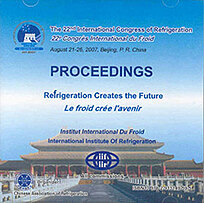
Summary
A Micro-CT scanner has been used to follow the moving interface during sublimation. Apple slices used as experimental samples were scanned at certain intervals when drying. The scanning images were analysed, then variation curves of grey value were obtained. For different thicknesses, freezing rates and primary drying temperatures, the different sublimation phenomena were compared. The results show that heat and mass exchange occurs both at the upper and the under surfaces of the sample. Also the exchange occurs on the side surface to some extent. To thick samples, the interface showing as a three-dimensional moving mode contracts to the geometric centre of the sample and presents approximate globosity. Samples frozen of slow freezing sublimate more quickly than those of quick freezing. The higher the primary drying temperature is, the more quickly sublimation interface moves. However, samples shrink and collapse more severely with high drying temperature under quick-freezing condition.
Available documents
Format PDF
Pages: ICR07-C1-1299
Available
Public price
20 €
Member price*
Free
* Best rate depending on membership category (see the detailed benefits of individual and corporate memberships).
Details
- Original title: Micro-CT scanning study on effect factors of sublimation interface during freeze-drying.
- Record ID : 2008-0958
- Languages: English
- Source: ICR 2007. Refrigeration Creates the Future. Proceedings of the 22nd IIR International Congress of Refrigeration.
- Publication date: 2007/08/21
Links
See other articles from the proceedings (839)
See the conference proceedings
Indexing
- Themes: Freeze-drying of foodstuffs and other products
- Keywords: Freeze-drying; Scanner; Calorimetry; Mass transfer; Heat transfer; Slice; Apple; Expérimentation; Fruit
-
Investigation of construction of the food freez...
- Author(s) : HAN Y.
- Date : 2006/05/21
- Languages : English
- Source: ACRA-2006. Proceedings of the 3rd Asian conference on refrigeration and air conditioning.
View record
-
Freeze-drying experiences with troubleshooting.
- Author(s) : WILLEMER H.
- Date : 1999/09/19
- Languages : English
- Source: 20th International Congress of Refrigeration: Refrigeration into the Third Millennium.
- Formats : PDF
View record
-
MODELLING THERMALLY CONTROLLED FREEZE-DRYING WI...
- Author(s) : ELVIRA C. de, DIAZ M., LOMBRANA I.
- Date : 1987/08/24
- Languages : English
- Source: Development in refrigeration, refrigeration for development. Proceedings of the XVIIth international Congress of Refrigeration.
- Formats : PDF
View record
-
STUDIES ON FREEZING AND FREEZE-DRYING OF FOOD P...
- Author(s) : CHATTOPADHYAY P., BOSE A. N., BOSE P. K.
- Date : 1985/05/20
- Languages : English
- Source: Fundamentals and Applications of Freeze-Drying to Biological Materials, Drugs and Foodstuffs.
- Formats : PDF
View record
-
BETA-ALUMINA CERAMICS MANUFACTURED BY THE SPRAY...
- Author(s) : NAGAI M., NISHINO T., NICHOLSON P. S.
- Date : 1985/05/20
- Languages : English
- Source: Fundamentals and Applications of Freeze-Drying to Biological Materials, Drugs and Foodstuffs.
- Formats : PDF
View record
